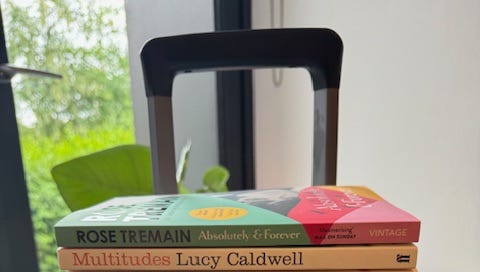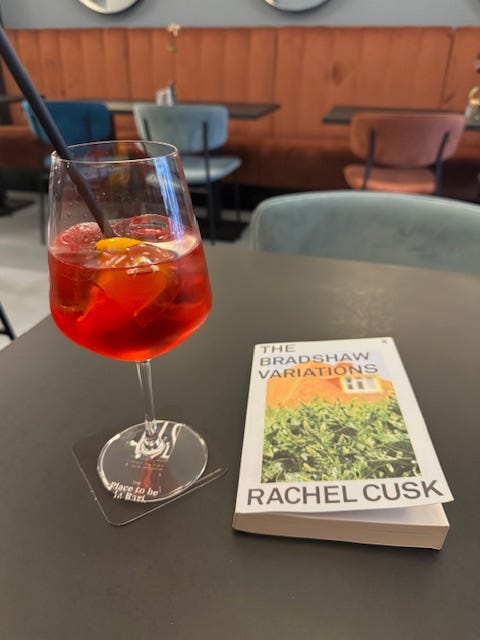I must have thousands of books. I have based the layout of my downstairs around shelves to accommodate them, floor-to-ceiling here, another one in that alcove there, let’s move upstairs and use that wasted space on the landing. I now have a large pile on the floor. It’s my TBR pile. I’m not sure where they’re going to live permanently. I may need to reconfigure a bedroom to house them. I’m currently on the look-out for an additional few square metres. Apparently two of my children are moving out in September which sounds promising. I keep most of the books I read as long as I haven’t been completely violated by them. I still have Milkman for some reason even though it is mainly incomprehensible and you had to be there to get it, and I think it’s because I have some sort of weird loyalty to female authors who come from my troubled city because it’s not easy dealing with all the cultural issues on top of the patriarchal ones.
I don’t keep books I couldn’t finish. I don’t like to see my failures in my direct line of vision. But the thing is, I can’t remember most of the books I have read. A lot of the Scandinavian thrillers and the Icelandic crime and the Scottish detectives all merge into one, there’s a body, an investigation, a lot of red herrings, more bodies, relationship problems, a conclusion, a neat and tidy one of course. There are some books on my shelves which remind me of times when I was more me and the world was my oyster and I read for a living, like all the Victorian novels I skimmed through when I was doing my English degree and the Evelyn Waughs and the George Orwells and Flann O’Brien’s The Third Policeman which is apparently a masterpiece of black humour, but in my opinion, is not. And I keep these because one day, I say, I’ll go back to them, but I probably never will.
But there are a small number of books, and I can remember exactly where I was when I read them, and I’m not sure if it was the book or the circumstances or a conscious effort to create some sort of emotional connection to a time and a place. I read Robert McLiam Wilson’s Eureka Street in between crossword puzzles when I was in hospital with a mysterious rash in 1998. I read Daphne Du Maurier’s The Birds and Other Stories when I was stuck doing jury service for a fortnight in the early 2000s. I read Before I Go To Sleep in a Premier Inn in Worcester in 2012 well into the early hours because it was a page-turner and I realise there haven’t been that many decent page-turners since The Girl on the Train1. I read the first of Andrew Taylor’s Ashes of London series in a hotel in Porto in 2017 when I had squeezed all my daughters into the same room as me because their room had dangerous windows and the first thing I always check in a hotel room is the windows. And I wanted to be like my friend whose husband read Alexander McCall Smith to her when she was in labour because that would have added to the memories but I had two babies who were almost born in the carpark so that wasn’t really an option for me. And whilst I can’t remember exactly where I was when I first read them, I can always remember that feeling of discovering an author I could get along with like Anne Tyler and Deborah Levy and Tessa Hadley and I’d work my way through their collection and hope when I’d finished that they’d stay alive to write another or I would find other authors I could get along with, and I’m currently working my way through everything by Rachel Cusk and Rose Tremain.
But I’ve noticed a change in my reading habits. I’m not willing to read just anything anymore. I’ll still get excited about the latest Jackson Brodie2 or Ruth Galloway3 and Colm Tóibín’s sequel to Brooklyn but I’ll put off reading them in case I’m disappointed. And I’ll aways be comforted by Richard Osman and know that along with Anthony Horowitz, he’s a safe bet to put in my suitcase. But I don’t want heavyweight or Booker or BookTok or what everyone else is reading or the books that might make me look like a clever feminist. I don’t even want to read self-help because it’s just theory. I want to have the lived experience and then find the language to wrap around what has happened to me. And whilst I’d recommend Richard Rohr’s Falling Upward as the only self-help you’ll ever need, I’ve found as much self-help in fiction as I have in 100,000 words telling me I am the mountain or I need seven habits to make me more effective or I should dare greatly and if you want to read a book about someone self-helping, make it Annie Proulx’s The Shipping News.
And I reckon I want books now that resonate with me, not books about women in their twenties having affairs or women who lived in 16th century Italy or were captured in Troy or are conducting a romance whilst time-travelling or going out to work in the 1950s and I don’t really want to read books written by men trying to portray women because they don’t know what they’re talking about unless they’re Donal Ryan who was raised by a steely group of them or John Banville who does both weak men and strong women equally well and never describes them as beautiful. And I want to read books where I can gasp suddenly and go that’s me. And I think about what the forensic ecologist, Professor Patricia Wiltshire4 said when asked if she’d like to see more forensic ecologists coming through and she said she would, but “you can’t be one if you’re young because you need to accumulate an awful lot of knowledge and be able to interpret that knowledge”. They planned to do a television programme about a forensic ecologist, she said, and they were going to use an actress who was nothing like her, and she was very young and that immediately told her it was nonsense and if they were going to adapt her story, they’d need to cast an actress who was the right age, one who had lived, like the lady who plays Vera or Imelda Staunton. It had to be realistic, she said, and I reckoned that’s what I wanted my books to be, realistic, interpreted knowledge, and that’s maybe why I’m the wrong generation for Sally Rooney.
And I think I don’t just want, I need, books about middle-aged women who hate themselves one day and then decide they’re pretty ok the next, who like their own company and how they’ve grown into themselves but still have to psych themselves up to look in the mirror, women who have to deal with teenagers who have mood swings and octogenarians who have mood swings and never be sure what they have in common with either of them, who have constant niggles about self-improvement but have marriages where someone wouldn’t change a thing about them, who have friends who are also middle-aged and when they catch up with them they have long conversations and they compare notes and they wrap language around what’s been happening to them and everything starts to make sense again. And I don’t really want to read books about women who are successful or thin or nice or shiny and always grateful and never say what they think in case it might offend because that’s not normal. And sometimes I think that’s what I want to write too, stuff like that, stuff that resonates, stuff that’s normal.
And where were you when you read something that made you gasp suddenly and go that’s me?
Which recently made it into the 100 best books of the 21st century.
By Kate Atkinson.
By Elly Griffiths.






I don't keep all the books I read, space would be an issue but I do keep those that hold memories of places or people I've encountered when I've been reading them. As years pass even that collection of books have been whittled down as I think where will they all go when I die, who will take them. Meantime this summer's reading is Michael Connolly's Lincoln Lawyer series with Invisible Women waiting in the wings.
A very lovely, honest piece, Deborah, and beautifully written.
Coincidentally, I have been thinking of culling my books and perhaps bringing them in to work to create a little (or quite large!) sharing shelf - I have many that I know I enjoyed reading but can’t necessarily recall the story between the covers! Like Margaret, who also commented, I’m concerned about who will have to cull my books eventually if I don’t.
I’ve made a list from your recommendations and will have it to hand when I pop in to my local Cowbridge bookstore; the suggestions will also come in handy when people ask me what I’d like…and I’ve just thought that a book would make a great gift when visiting a friend.
Thank you for making my Saturday start in Drogheda a very enjoyable and reflective one. X